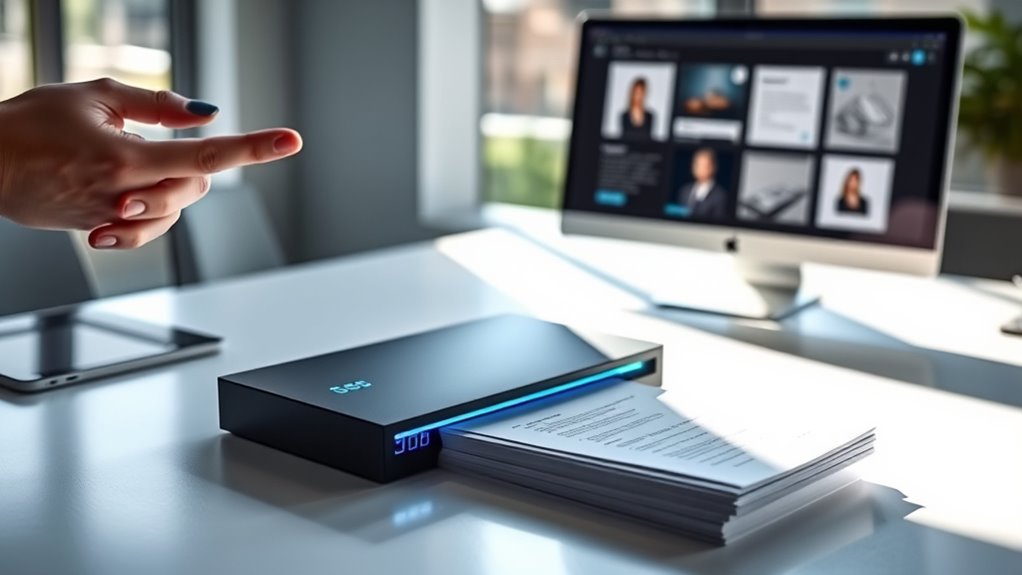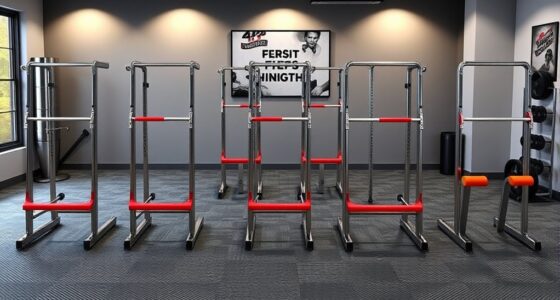If you’re looking to make digitizing effortless in 2025, I recommend the best wireless scanners with fast speeds, reliable Wi-Fi, and easy software integration. Models like the ScanSnap iX2500, Epson Workforce ES-580W, and Canon R10 offer high-volume capacity, duplex scanning, and portability, making them perfect for home or office use. Many come with touchscreen interfaces and cloud connectivity. Stay with me to explore the top options that fit your needs and workflow perfectly.
Key Takeaways
- Look for models with high scanning speeds, duplex capability, and large auto feeder capacities for efficient large-volume digitization.
- Prioritize wireless standards like Wi-Fi 6, compatibility with multiple devices, and cloud integration features for seamless connectivity.
- Choose portable, lightweight scanners with user-friendly touchscreens and quick setup options for on-the-go use.
- Consider document handling features such as versatile feeding options, automatic enhancements, and support for various document types.
- Evaluate device compatibility, ease of use, and additional functionalities like OCR, micro SD support, and adjustable trays for effortless digitizing.
ScanSnap iX2500 Wireless or USB Document Scanner with Touchscreen and Auto Feeder
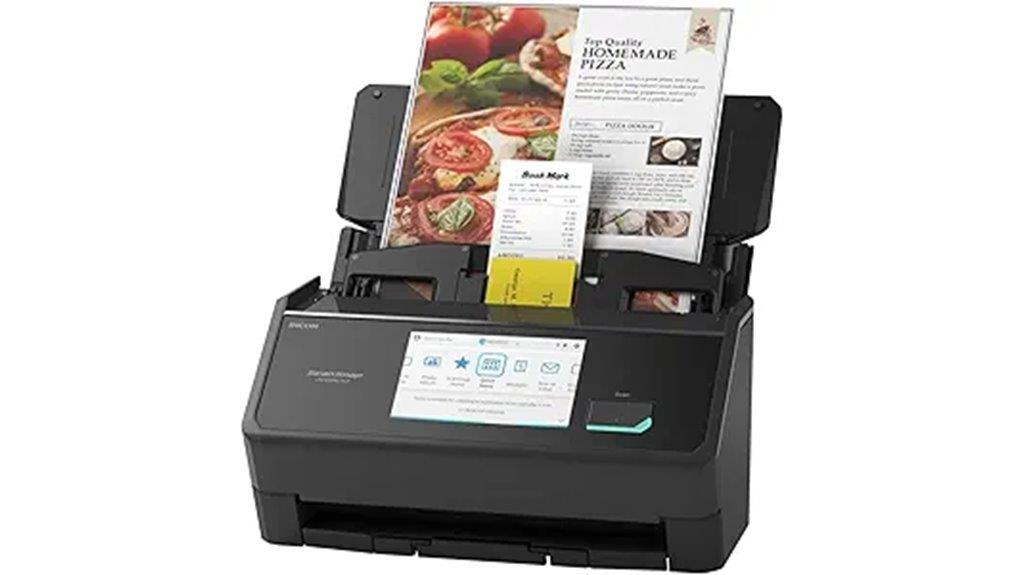
If you’re looking for a reliable, high-speed scanner that’s easy to operate, the ScanSnap iX2500 is an excellent choice. It features a sleek, durable design in black or white and offers a large, responsive touchscreen that’s as intuitive as a smartphone. With a 100-sheet auto feeder, it scans double-sided pages at 45 pages per minute, saving you time. It supports USB-C and Wi-Fi 6, enabling flexible placement and wireless use without a computer. Compact and lightweight, it’s perfect for home or office. Its high-speed duplex scanning, seamless cloud integration, and customizable software make digitizing large volumes quick, effortless, and efficient.
Best For: individuals or small offices seeking a high-speed, easy-to-use scanner with wireless capabilities and large capacity for efficient document and photo digitization.
Pros:
- Fast duplex scanning at 45 pages per minute with a 100-sheet auto feeder
- Large, smartphone-like touchscreen for intuitive operation and customization
- Wireless connectivity via Wi-Fi 6 and USB-C for flexible placement and easy setup
Cons:
- Occasional connectivity reset required when experiencing issues
- Possible page bunching during large scans, requiring page folding adjustments
- Slightly higher initial cost compared to basic scanners
ScanSnap iX1300 Compact Wireless & USB Document Scanner
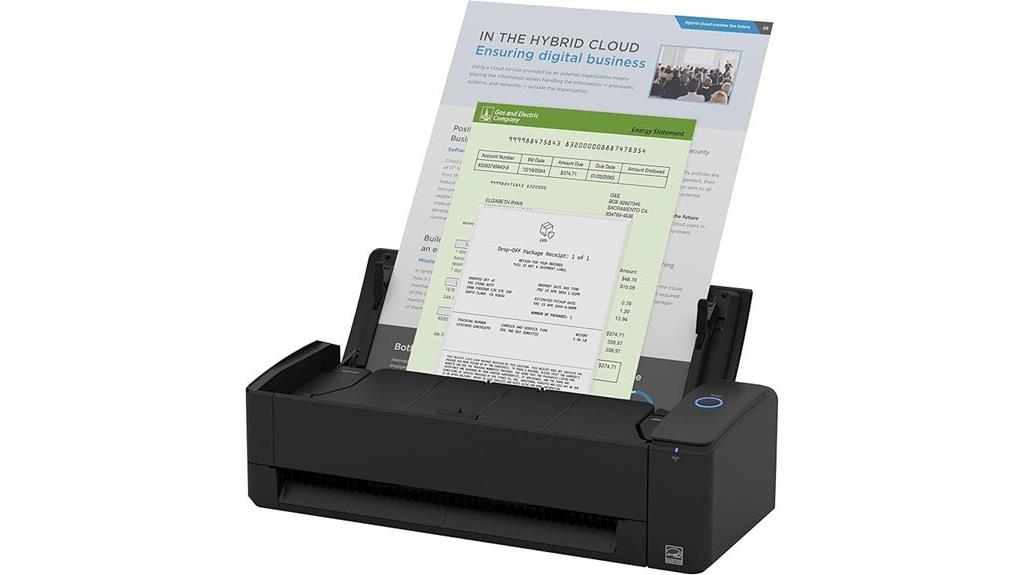
The ScanSnap iX1300 is an excellent choice for small offices or home users who need a versatile, space-saving scanner that’s easy to set up and use. Its compact design fits neatly into tight spaces and weighs just 4.4 pounds, making it highly portable. With both USB and Wi-Fi connectivity, I can scan to multiple devices, including Macs, PCs, mobile phones, and cloud services. It handles various documents—papers, photos, business cards, even plastic cards—at up to 30 ppm. The user-friendly software and quick setup make digitizing quick and straightforward, making it perfect for small-scale, on-the-go scanning tasks.
Best For: small office or home users seeking a compact, versatile scanner that easily connects to multiple devices and handles various document types.
Pros:
- Space-saving, lightweight design ideal for small spaces and portability
- Fast duplex scanning up to 30 ppm with reliable Wi-Fi and USB connectivity
- User-friendly setup and software, suitable for quick digitization of documents, photos, and cards
Cons:
- Occasional paper jams, especially with manual feed and thicker materials
- Software interface can be clunky or confusing, particularly on Windows
- Initial Wi-Fi setup may require USB connection, adding extra steps for some users
Epson Workforce ES-580W Wireless Document Scanner
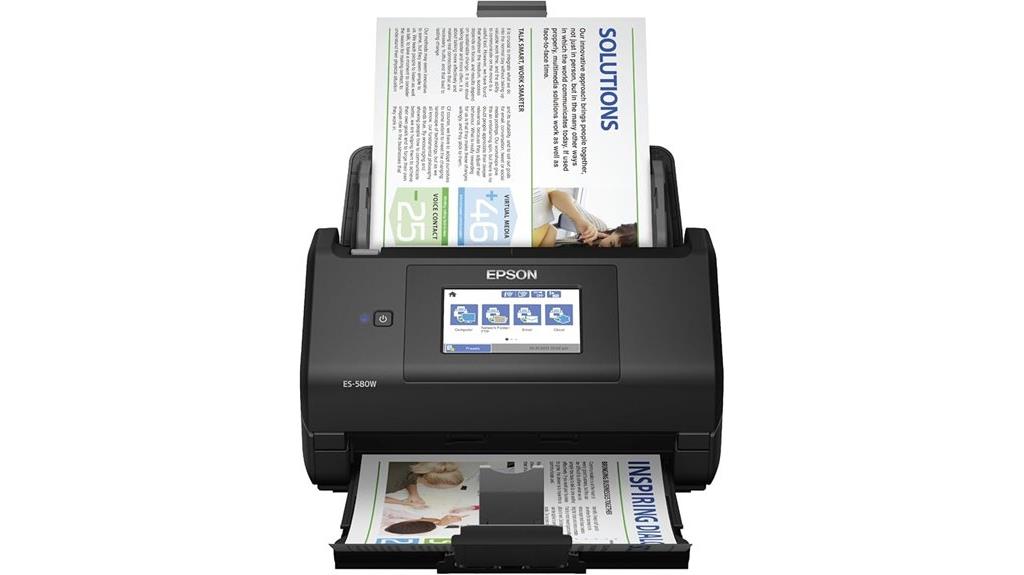
For busy professionals who need reliable, fast, and wireless scanning, the Epson Workforce ES-580W stands out as an excellent choice. It offers wireless connectivity, so you can scan directly to your devices or cloud storage without a computer. With speeds of up to 35 pages per minute and a 100-sheet Auto Document Feeder, it handles large jobs efficiently. The 4.3-inch touchscreen makes operation intuitive, while OCR technology creates searchable PDFs and editable Word or Excel files. Compatible with both PC and Mac, it supports various paper types and sizes, making it versatile for any document management task.
Best For: busy professionals and small offices seeking fast, wireless, and versatile document scanning solutions that easily integrate with cloud storage and office applications.
Pros:
- Wireless connectivity allows direct scanning to devices and cloud services without needing a computer
- High-speed scanning of up to 35 pages per minute with a large 100-sheet Auto Document Feeder
- Intuitive 4.3-inch touchscreen simplifies operation and document management
Cons:
- May be more expensive than basic scanners for casual or infrequent use
- Large paper size support might be limited compared to specialized or professional-grade scanners
- Requires Wi-Fi setup and connection, which could be challenging in unstable network environments
Epson Workforce ES-C320W Wireless Compact Document Scanner
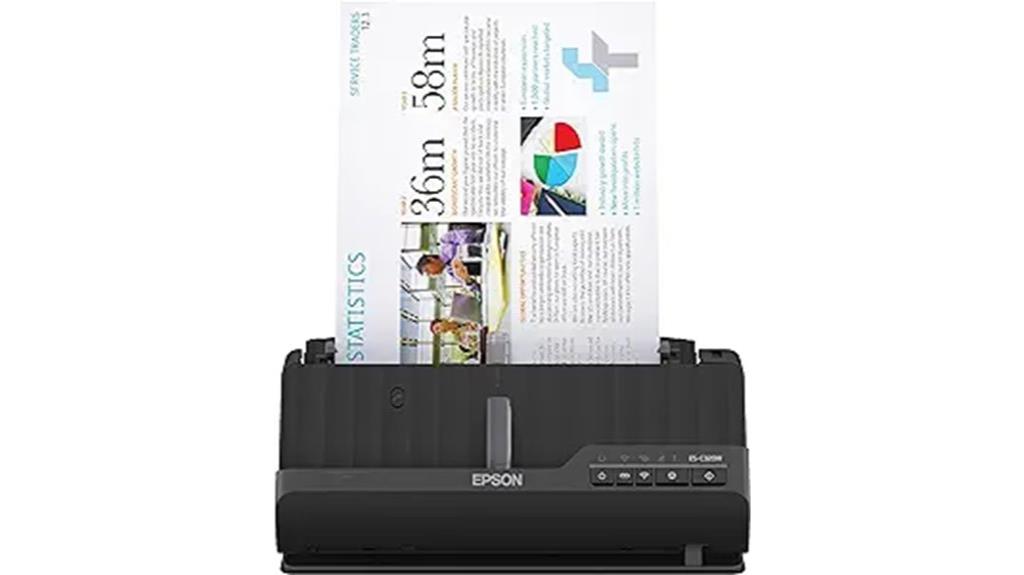
The Epson Workforce ES-C320W Wireless Compact Document Scanner stands out for those who need a space-saving, portable device without sacrificing speed or versatility. Its ultra-compact design saves 60% of desk space compared to larger models, making it perfect for tight spots in home or office. Weighing just 3.85 pounds and with a vertical scanning path, it handles longer pages and stacks of up to 20 sheets efficiently. With speeds up to 30 pages per minute and wireless connectivity to smartphones, tablets, and cloud services, it streamlines your workflow. While software quirks exist, its quick, high-quality scans make it an excellent choice for personal or light professional use.
Best For: individuals or small offices seeking a compact, portable scanner that offers quick, high-quality double-sided scanning and wireless connectivity for everyday document management.
Pros:
- Ultra-compact, space-saving design ideal for tight workspaces
- Fast scanning speed of up to 30 pages per minute with double-sided capability
- Wireless connectivity enables easy scanning to devices and cloud services without cables
Cons:
- Software can be inconsistent, especially with certain applications and devices
- Limited filename length and saving options may hinder workflow
- Paper feeding can be finicky, requiring precise page placement
Epson Workforce ES-60W Wireless Portable Document Scanner

If you’re constantly on the move and need a reliable scanner that packs a punch in a compact size, the Epson Workforce ES-60W Wireless Portable Document Scanner stands out as an excellent choice. Its lightweight, compact design (just 10.7 x 1.9 x 1.4 inches) makes it perfect for traveling. It scans a single page in as little as 4 seconds, boosting your productivity. Easily switching between wireless and USB, it works seamlessly with PC, Mac, iOS, and Android devices. The LCD display shows battery and connection status, and with Epson ScanSmart and Nuance OCR, you can organize, search, and upload documents directly to the cloud effortlessly.
Best For: those who need a portable, high-speed scanner suitable for frequent travel and on-the-go document digitization.
Pros:
- Extremely compact and lightweight design for easy portability
- Fast scanning speed of just 4 seconds per page to boost productivity
- Seamless wireless and USB connectivity compatible with multiple devices and platforms
Cons:
- Limited to single-sheet scanning, not suitable for multi-page documents
- Operating temperature range may restrict use in extreme environments
- Reliance on software for advanced features could require additional setup or updates
Epson WorkForce ES-50 Portable Sheet-Fed Document Scanner for PC and Mac

Weighing just under a pound and fitting comfortably into a backpack, the Epson WorkForce ES-50 Portable Sheet-Fed Document Scanner is perfect for mobile professionals who need quick, reliable scanning on the go. Its compact size (1.8 x 10.7 x 1.3 inches) and USB power make it highly portable without sacrificing speed—scanning a page in just 5.5 seconds. It handles documents up to 8.5 x 72 inches, IDs, and receipts with ease. Compatible with PC and Mac, it works seamlessly with popular software, including cloud storage and OCR tools. While lacking wireless features, its simplicity, speed, and crisp image quality make it an excellent choice for travel, home, or small office use.
Best For: mobile professionals, students, and small office users who need quick, portable scanning solutions without the need for wireless connectivity.
Pros:
- Extremely portable and lightweight, fitting easily into backpacks and small spaces
- Fast scanning speed of just 5.5 seconds per page with high-quality crisp images
- Compatible with both Windows and Mac, supporting cloud storage and OCR features
Cons:
- No wireless or Wi-Fi capabilities, requiring USB connection for operation
- Lacks paper guides, making precise alignment more challenging for perfectionists
- Not ideal for glossy, black-and-white photos due to washed-out image quality
Epson Workforce ES-500W II Wireless Color Duplex Desktop Scanner
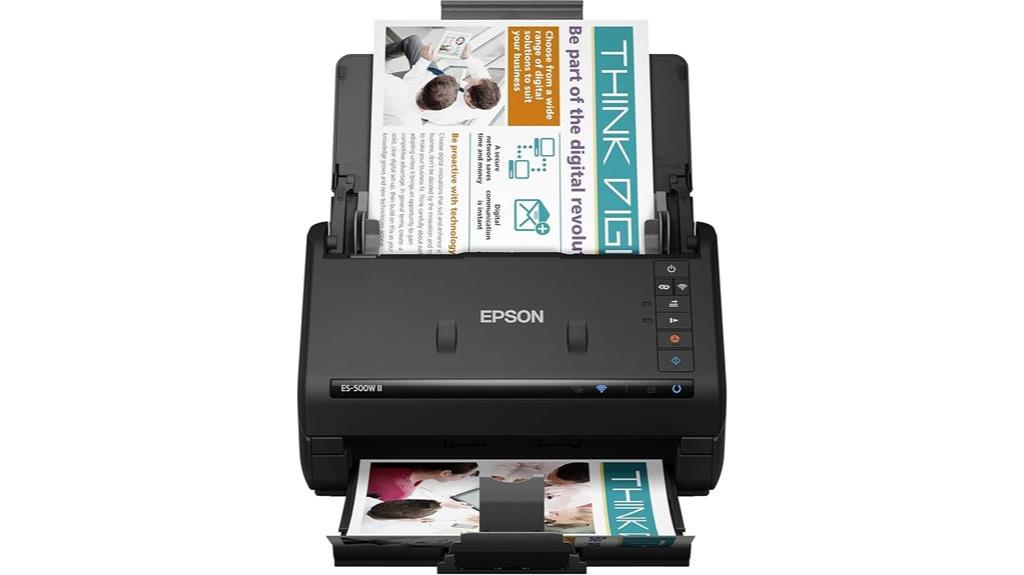
Designed for busy professionals and small offices, the Epson Workforce ES-500W II stands out with its rapid scanning speed of up to 35 pages per minute and duplex capability, allowing both sides of a sheet to be captured in a single pass. Its 50-sheet auto document feeder handles various paper sizes efficiently, and its compact design makes it suitable for any workspace. With wireless connectivity, you can scan directly to devices or cloud services using the Epson Smart Panel app or ScanSmart software. Reliable and easy to use, it’s perfect for high-volume tasks, offering high-quality color and black-and-white scans at 300 dpi.
Best For: busy professionals and small offices needing fast, reliable duplex scanning with wireless connectivity.
Pros:
- High-speed scanning of up to 35 pages per minute with duplex capability for both sides in a single pass
- Wireless connectivity allows direct scanning to devices and cloud services via Epson Smart Panel app or ScanSmart software
- Compact design with a 50-sheet auto document feeder, suitable for high-volume tasks and limited workspace
Cons:
- Wi-Fi setup may require careful attention to avoid defaulting to Wi-Fi mode, complicating USB connections
- Does not support high-resolution scanning of large legal sheets without errors
- Lacks a color display screen, which some users might prefer for easier preview and adjustments
Brother ADS-1350W Wireless Desktop Scanner
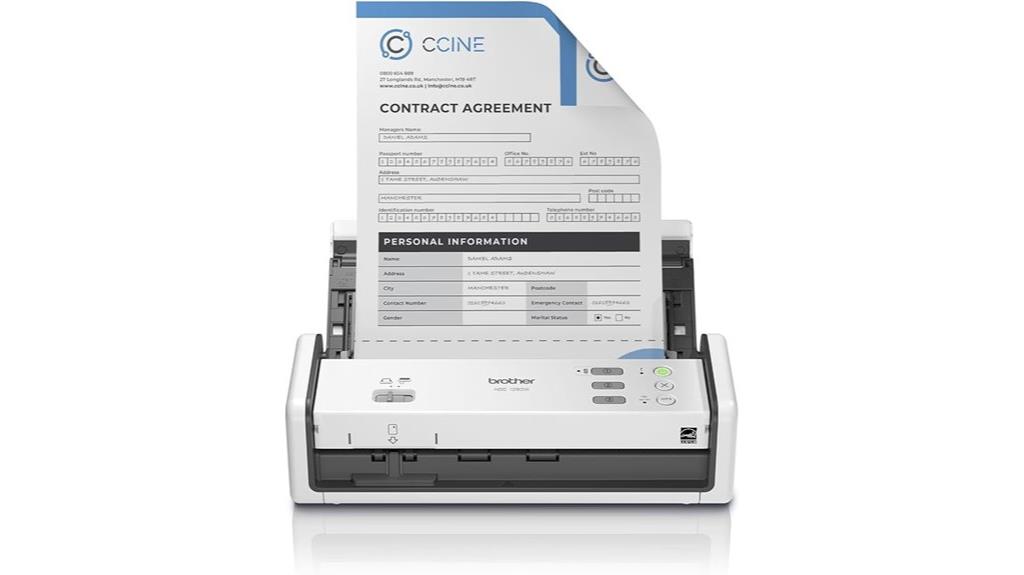
The Brother ADS-1350W Wireless Desktop Scanner stands out as an ideal choice for busy professionals and small business owners who need reliable, high-speed scanning with versatile connectivity options. It connects directly to your computer via USB-C or wirelessly over Wi-Fi using the Brother Mobile Connect App. Its compact design makes it perfect for work, home, or mobile use, handling large jobs at speeds up to 30 pages per minute. With features like single-pass double-sided scanning, a 20-page automatic document feeder, and the ability to digitize photos, receipts, and cards, it streamlines document management effortlessly. Bundled software enhances organization, editing, and searchability, making it a versatile, complete solution.
Best For: busy professionals and small business owners seeking a reliable, high-speed, versatile scanner for home, office, or mobile use.
Pros:
- Fast scanning speeds of up to 30 pages per minute for efficient document handling
- Wireless connectivity via Wi-Fi and USB-C for flexible setup options
- Bundled software enhances organization, editing, and searchability of scanned files
Cons:
- May be limited for very large volume scanning compared to high-end industrial scanners
- Some features require the Brother Mobile Connect App, which may need setup and updates
- Compact size might limit handling of very large or bulky documents
Canon imageFORMULA R40 Office Document Scanner
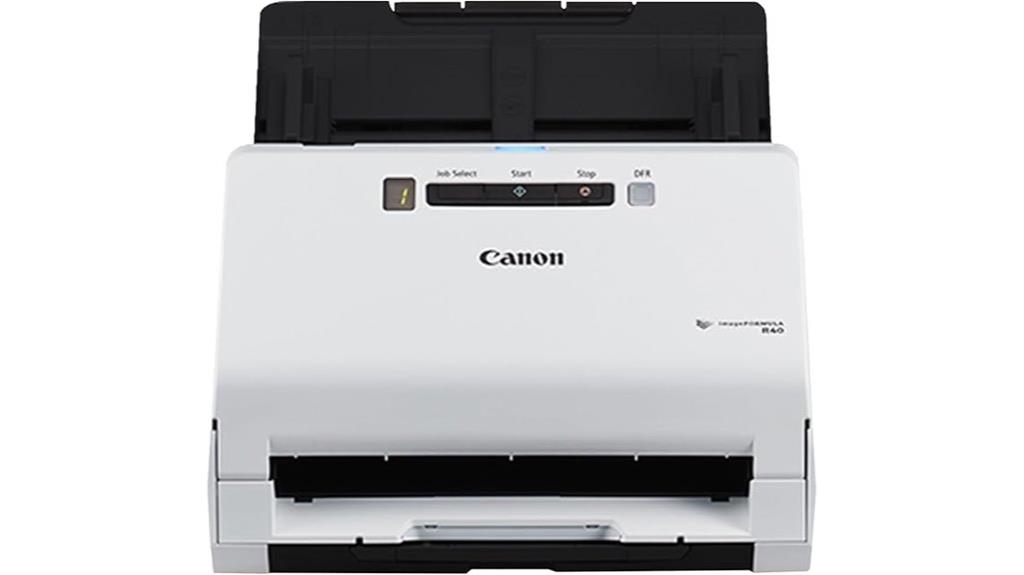
If you’re looking for a reliable scanner that streamlines office workflows, the Canon imageFORMULA R40 Office Document Scanner is an excellent choice. It works with Windows and Mac, supporting duplex scanning at impressive speeds—up to 40 pages per minute in color and 80 images per minute double-sided. Its easy setup via USB and simple one-touch operation make it accessible, even for beginners. The R40 handles a variety of documents, from receipts to long reports up to 118 inches. Plus, it supports cloud scanning and comes bundled with useful software like Canon CaptureOnTouch and OCR tools, backed by a one-year warranty and US-based support.
Best For: small to medium offices and professionals seeking fast, reliable, and easy-to-use document scanning with versatile document handling capabilities.
Pros:
- Rapid scanning speeds of up to 40 pages per minute in color and 80 images per minute duplex, increasing productivity.
- Simple setup via USB and one-touch operation make it user-friendly for all skill levels.
- Supports a wide range of documents, including long reports up to 118 inches and various types like receipts, photos, and business cards.
Cons:
- Limited to USB connection; lacks built-in Wi-Fi or network connectivity.
- Basic bundled software may require additional purchases for advanced features.
- No automatic document feeder for larger batch scanning without manual intervention.
Epson Workforce ES-400 II Document Scanner for PC and Mac
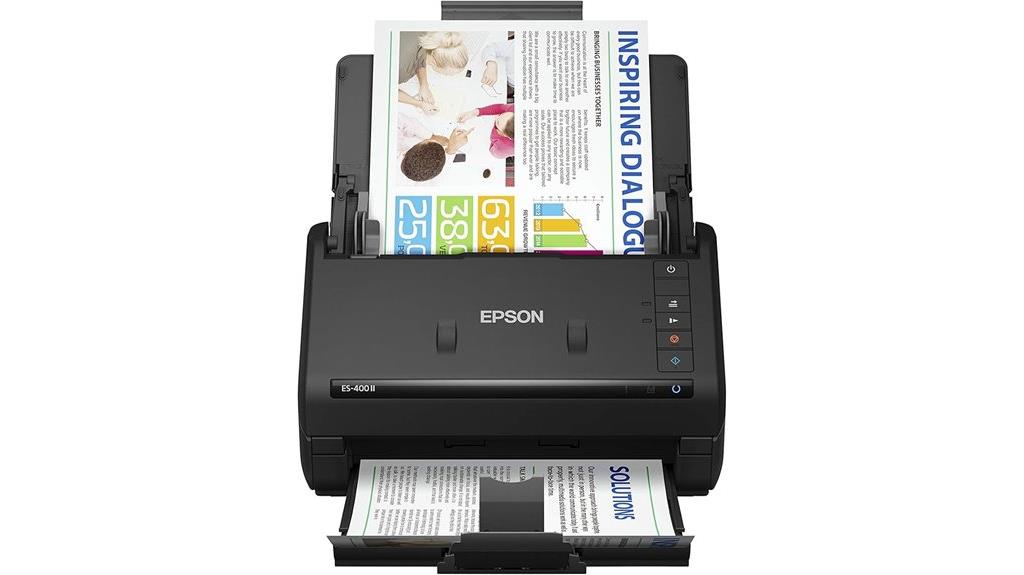
For anyone seeking a fast, reliable desktop scanner that works seamlessly with both PC and Mac, the Epson Workforce ES-400 II stands out as a top choice. It features a 50-sheet Auto Document Feeder and can scan up to 35 pages per minute at 300 dpi, efficiently handling duplex documents and various sizes. The scanner offers auto crop, background removal, and dirt detection to guarantee high-quality results. Paired with Epson ScanSmart software, it simplifies workflows with preview, cloud uploads, and OCR for searchable PDFs. Its compact design, straightforward setup, and impressive speed make it ideal for office or home use.
Best For: professionals and small offices seeking a fast, reliable, and versatile desktop scanner compatible with both PC and Mac.
Pros:
- High-speed duplex scanning up to 35 pages per minute at 300 dpi
- User-friendly Epson ScanSmart software with cloud integration and OCR capabilities
- Compact design with a 50-sheet Auto Document Feeder for efficient multi-page scans
Cons:
- Software interface may not meet all user preferences, potentially requiring third-party solutions
- Slightly higher price point compared to basic scanners with similar features
- Limited to USB connectivity without built-in Wi-Fi or network options
Brother DS-640 Compact Mobile Document Scanner, (Model: DS640) 1.5x2x11.9
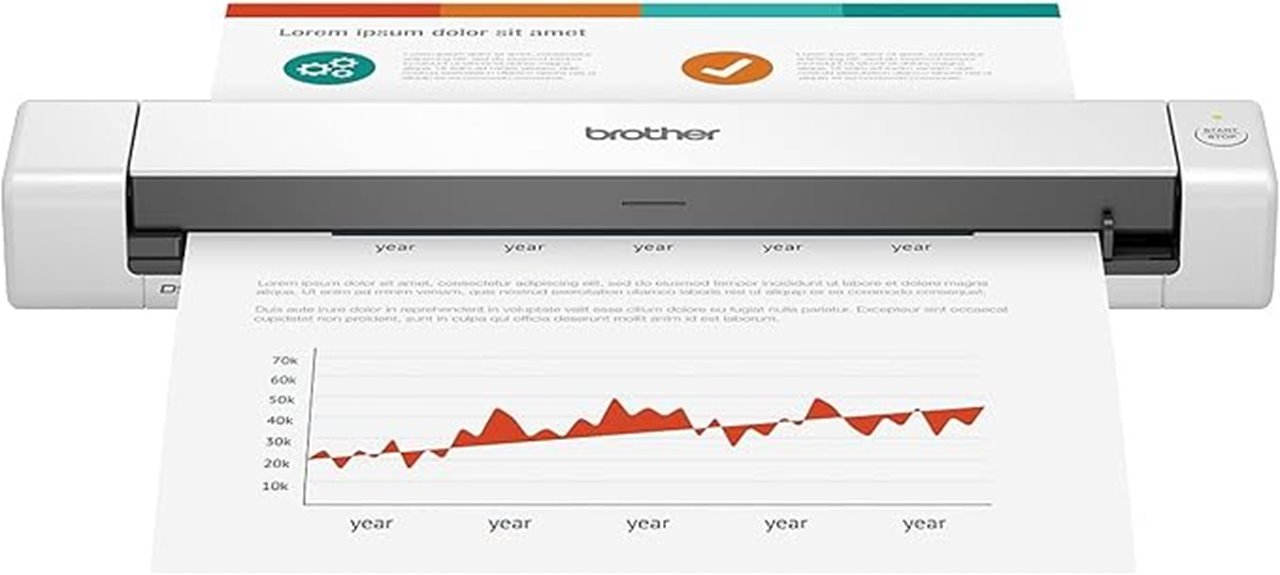
Designed for mobile professionals, the Brother DS-640 Compact Mobile Document Scanner stands out with its compact size and lightweight build, making it easy to carry anywhere. Measuring less than 11.8 inches long and weighing about 1.5 pounds, it fits comfortably in a bag or briefcase. Despite its small footprint, it scans up to 16 pages per minute in color or black-and-white at 300 dpi, handling a variety of documents, including IDs and business cards. Powered via a micro USB connection, it offers flexible, portable scanning. Its software supports multiple destinations, including OCR and cloud storage, streamlining your workflow on the go.
Best For: mobile professionals and small business users who need a portable, versatile scanner for on-the-go document, ID, and business card scanning.
Pros:
- Compact and lightweight design makes it highly portable and easy to carry.
- Fast scanning speeds of up to 16 ppm for efficient workflow.
- Supports multiple document types and sizes, including IDs and business cards, with versatile software options.
Cons:
- Requires internet connection for software download and setup.
- Limited to 300 dpi resolution, which might not suit high-detail scanning needs.
- Power solely via micro USB, which may require additional cables or power sources for some setups.
Epson FastFoto FF-680W Wireless Photo and Document Scanner
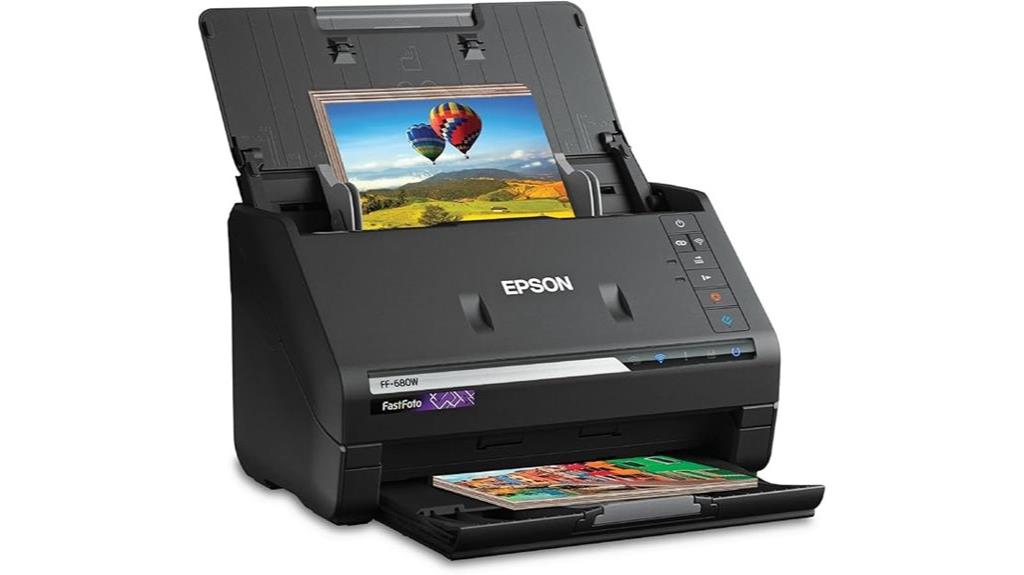
The Epson FastFoto FF-680W stands out as the ideal choice for those who need to quickly digitize large collections of photos and documents, thanks to its lightning-fast scanning speeds. It can scan thousands of photos at one per second and batch scan up to 36 images simultaneously, handling various sizes like Polaroids, panoramas, and postcards. With automatic enhancements such as color restoration and red-eye reduction, it brings old photos back to life. Its dual-sided, high-speed document scanning—up to 90 images per minute—makes quick work of paperwork. Compact and wireless, it easily connects to cloud services, PCs, and mobile devices, streamlining the entire digitization process.
Best For: individuals and small businesses who need to efficiently digitize large collections of photos and documents with high speed and quality.
Pros:
- Fast scanning speeds, capable of digitizing thousands of photos quickly and efficiently
- Versatile handling of various photo sizes and types, including Polaroids and panoramas
- Automatic image enhancement features that restore and improve old or damaged photos
Cons:
- Potential compatibility issues with older computers or certain cables, requiring updates or replacements
- Higher initial cost may be a barrier for occasional or casual users
- Requires internet connection for cloud and app functionalities, which could be a limitation in offline environments
Canon imageFORMULA R10 Portable Document Scanner
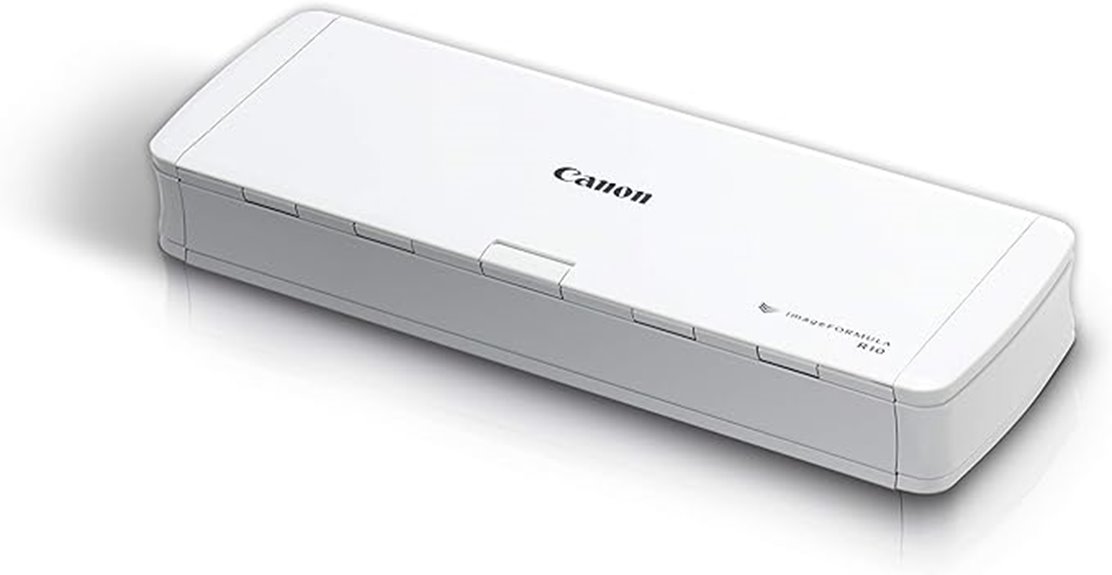
If you need a portable scanner that easily fits into your mobile or home office setup, the Canon imageFORMULA R10 is an excellent choice. It’s lightweight, measuring just 3.75 x 11.2 x 1.57 inches and weighing only 2.2 pounds, making it perfect for on-the-go scanning. It connects via USB and supports duplex, double-sided scanning at up to 12 pages per minute, with a 20-sheet automatic feeder. Compatible with Windows and Mac, it handles various media types like receipts, cards, and reports. Its user-friendly software simplifies setup, allowing you to create searchable PDFs and JPEGs effortlessly, making digitization quick and convenient.
Best For: users seeking a portable, easy-to-use scanner for mobile, home, or remote office environments that can handle various media types with fast duplex scanning.
Pros:
- Compact, lightweight design for portability and convenience
- Supports duplex scanning at up to 12 pages per minute with a 20-sheet feeder
- Compatible with both Windows and Mac, with automatic software updates
Cons:
- Occasional issues with blank pages or partial feeds requiring rescans
- Software and firmware updates can take time and may initially require troubleshooting
- Limited to USB power, which may be less versatile for certain setups
Doxie Pro DX400 Duplex Document and Receipt Scanner for Mac and PC
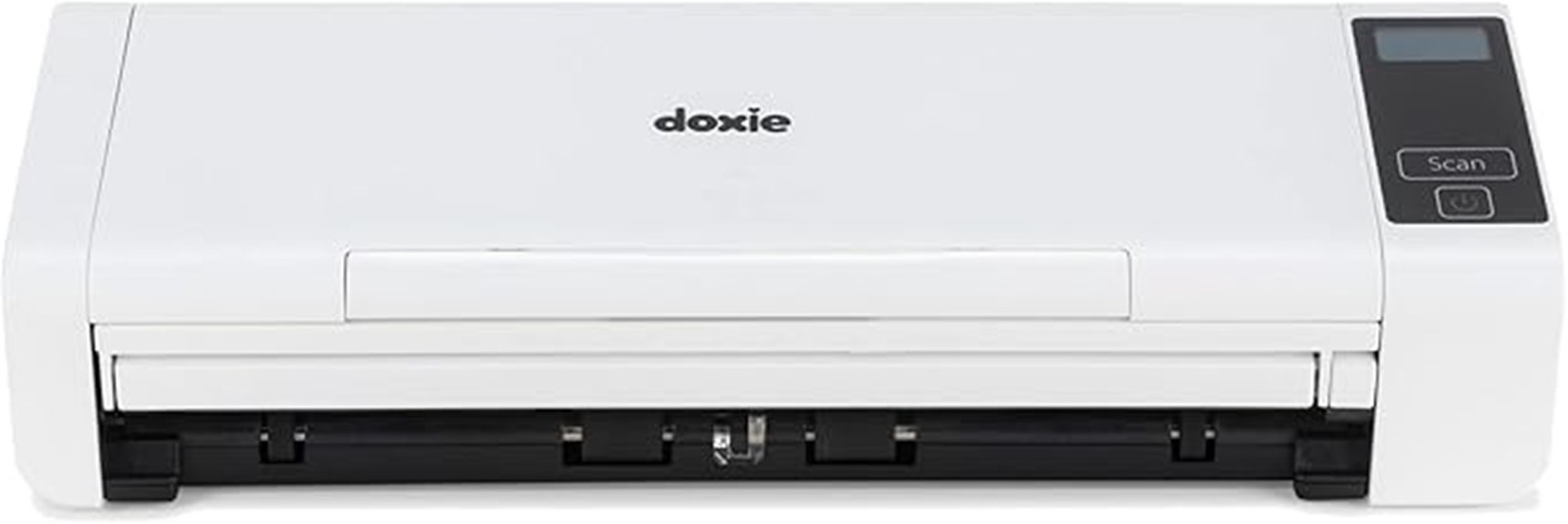
For anyone seeking a reliable scanner that effortlessly handles both sides of documents and receipts, the Doxie Pro DX400 stands out. It works seamlessly with Mac and PC, offering intuitive software that simplifies operation without complicated drivers. This compact device delivers high-quality scans of everything from reports and invoices to business cards and photos. Its duplex scanning captures both sides in crisp detail, while features like automatic cropping, rotation, and contrast boost enhance image quality. The collapsible document feeder and direct feed slot make handling thick or delicate papers easy. Plus, its small footprint and user-friendly software make it a versatile addition to any home or office setup.
Best For: users seeking a compact, reliable duplex scanner compatible with Mac and PC for efficiently digitizing documents, receipts, and photos.
Pros:
- Supports two-sided scanning with crisp duplex images and automatic cropping and rotation.
- Compatible with Mac and PC, with intuitive software that simplifies operation and organization.
- Compact design with collapsible document feeder and direct feed slot, ideal for limited workspace.
Cons:
- Weighs just over 3 pounds, which might be less portable for frequent on-the-go use.
- Limited to a 1-year warranty, which may not cover extensive use over time.
- Requires wired connection, so it lacks wireless or Wi-Fi functionality for remote scanning.
Brother DS-940DW Duplex and Wireless Compact Mobile Document Scanner

Looking for a portable scanner that combines wireless convenience with fast, duplex scanning? The Brother DS-940DW fits the bill perfectly. It’s compact, lightweight—just 1.5 pounds—and easily fits into bags or pockets, making it ideal for mobile use. It scans both sides of documents in a single pass at up to 16 pages per minute, supporting long documents and cards. With WiFi and micro SD support, it operates independently of a PC, and the software suite includes OCR and file management tools. While setup can be tricky, once configured, it provides reliable, quick, and versatile scanning for home or small office needs.
Best For: professionals and small office users who need a portable, wireless scanner that offers fast duplex scanning and versatile document handling on the go.
Pros:
- Compact and lightweight design for easy portability and storage
- Fast duplex scanning at up to 16 pages per minute, supporting various document types and lengths
- Wireless connectivity and micro SD support enable standalone operation without a PC
Cons:
- Complex setup process, especially for configuring WiFi in infrastructure mode
- Limited to 2.4 GHz WiFi networks, with no support for 5G networks
- Instruction clarity issues may challenge less tech-savvy users during initial setup
Factors to Consider When Choosing Wireless Document Scanners

When selecting a wireless document scanner, I focus on connectivity options, scan speed, and compatibility to guarantee it fits my workflow. Size and portability matter if I need to scan on the go, while document handling features help manage different types of papers efficiently. Considering these factors helps me choose a scanner that balances performance and convenience.
Connectivity Options
Choosing the right wireless connectivity options is vital because it directly affects how easily and reliably you can scan documents without cables. Most scanners support Wi-Fi, allowing direct scanning to devices without hassle. Many models also offer dual connectivity, including USB, giving you flexibility in setup. Compatibility with standards like Wi-Fi 5 (802.11ac) or Wi-Fi 6 (802.11ax) influences both transfer speed and connection stability, so it’s worth checking. Some scanners enable direct cloud uploads or mobile device pairing through dedicated apps or built-in Wi-Fi features, streamlining your workflow. Proper network configuration, including secure passwords and choosing between 2.4 GHz or 5 GHz bands, is essential for consistent, trouble-free operation. Your choice of connectivity options can make or break your scanning experience.
Scan Speed & Volume
The speed at which a wireless document scanner can process pages directly impacts your workflow, especially when handling large volumes. Higher ppm rates mean you can digitize more documents in less time, vital for busy offices. Duplex scanners that scan both sides simultaneously boost efficiency further, saving valuable seconds on each page. The capacity of the automatic document feeder (ADF) also matters—larger capacities, like 50 or more sheets, allow for continuous scanning without frequent reloading. Faster scan speeds reduce the overall time needed for big projects, making high-volume tasks more manageable. Additionally, consistent performance during extended use ensures reliability, so your workflow stays smooth without dips in speed or quality. Choosing a scanner with ideal speed and volume features keeps your digitization process efficient and stress-free.
Compatibility & Software
How well a wireless document scanner integrates with your devices and software can make or break your digitization process. I recommend checking that the scanner’s software is compatible with your operating system—whether Windows, Mac, iOS, or Android—to prevent connection hiccups. It’s also essential to verify it supports common file formats like PDF, JPEG, or TIFF, and offers OCR capabilities for searchable, editable documents. Seamless connectivity via Wi-Fi and USB is a must, fitting your preferred workflow. Look for scanners with management software or apps that make organizing, editing, and sharing files straightforward. Additionally, compatibility with cloud services like Dropbox, Google Drive, or OneDrive allows for direct uploads and remote access, streamlining your entire digital workflow.
Portability & Size
When selecting a wireless document scanner, size and portability play crucial roles in guaranteeing it fits seamlessly into your workflow. Smaller, lightweight models—under 3 pounds and less than 12 inches long—are perfect for mobile use and travel. Compact designs with foldable or upright features save desk space and easily fit into bags or backpacks, making on-the-go scanning effortless. These portable scanners generally lack large input trays and advanced features, prioritizing mobility over high-volume capacity. Many come with built-in batteries, allowing standalone operation without needing a constant power source or connection to a computer. The form factor and weight directly impact how easily you can transport, set up, and use your scanner in various environments. Prioritizing portability ensures your scanner adapts to your dynamic workflow.
Document Handling Features
Choosing a wireless document scanner with versatile handling features guarantees you can efficiently digitize a wide range of document types. Look for scanners with adjustable or multiple input options, like auto feeders and manual feeds, to handle different sizes and textures. Duplex scanning is essential to save time by capturing both sides of a page in a single pass. Consider the maximum paper capacity of the input tray to minimize reloads during large batches. Compatibility with various media types, including thick documents, plastic cards, receipts, and oversized pages, ensures flexibility for diverse needs. Additionally, automatic recognition, cropping, and rotation of pages streamline your workflow, improving the quality of your digital files and making the entire process more efficient.
Ease of Setup
Setting up a wireless document scanner can vary in complexity depending on the device’s design and features. Some models require initial USB connections and driver installations, which can slow down setup. Others boast built-in Wi-Fi or Bluetooth pairing, making the process much quicker and more straightforward. Compatibility with different operating systems like Windows, macOS, iOS, or Android also affects how easily you can connect and configure the device. Clear, step-by-step instructions and intuitive interfaces play a vital role in reducing setup time and frustration. Devices that simplify these steps allow for a seamless progression from unboxing to scanning, saving you time and effort. When choosing a scanner, look for models with user-friendly setup procedures to guarantee effortless configuration from the start.
Frequently Asked Questions
How Do Wireless Scanners Connect to Multiple Devices Simultaneously?
Wireless scanners connect to multiple devices simultaneously mainly through Wi-Fi or Bluetooth technology. I simply set up the scanner on my Wi-Fi network, allowing any device connected to that same network to access it. For Bluetooth, I pair the scanner with each device I want to use. Some models even support multi-user modes, so I can scan documents directly to different devices without reconnecting each time.
What Security Features Are Available for Wireless Document Transmission?
Wireless document transmission often includes security features like encryption, WPA2 or WPA3 protocols, and secure Wi-Fi connections to protect your data. Many scanners also offer password protection and user authentication, ensuring only authorized individuals access sensitive files. I always look for these security options to keep my information safe during wireless transfers, giving me peace of mind knowing my documents are protected from unauthorized access.
Can Wireless Scanners Handle High-Volume Scanning Without Overheating?
Yes, wireless scanners can handle high-volume scanning without overheating, especially those designed for professional or heavy-duty use. I’ve noticed that many models feature advanced cooling systems and optimized processing speeds that prevent overheating during extended sessions. It’s important to choose a scanner with a high duty cycle rating and good build quality, which guarantees it can manage continuous operation without issues, making them perfect for demanding tasks.
Are There Compatibility Issues With Specific Operating Systems or Cloud Services?
Nope, compatibility issues are pretty much a thing of the past—at least, that’s what manufacturers claim. I’ve found most wireless scanners work seamlessly with popular operating systems like Windows, macOS, and even some Linux distributions. Cloud service compatibility is usually a breeze too, as long as you keep your firmware updated. Still, I’d recommend double-checking specific models’ specs—better safe than troubleshooting later!
How Does Battery Life Impact Portability and Continuous Use?
Battery life really impacts how I use my scanner on the go. When the battery lasts longer, I can scan multiple documents without needing to recharge constantly, making it much more portable and convenient. If the battery drains quickly, I worry about being caught without power during vital moments. So, I always look for models with strong battery life to guarantee continuous use and seamless portability.
Conclusion
Think of choosing a wireless scanner like finding the perfect key — it opens the door to effortless digitizing. I once struggled with cluttered piles until I discovered my scanner’s auto-feeder, transforming chaos into order in minutes. With so many top options in 2025, you’re bound to find the right fit to make your workflow seamless. Let this guide help you unleash a smarter, more organized way to handle your documents.
